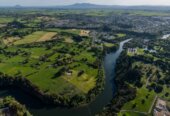A group of volunteers checks the tracking tunnels at the Rotopiko reserve.
Decked out in their wellies, caps and hi-vis vests, teams of volunteers from Te Awamutu Rotary Club are making a positive impact on the wellbeing of the Rotopiko wetlands in Ōhaupo.
The volunteers have added valuable muscle to ongoing National Wetland Trust (NWT) conservation efforts for the past seven months or so, helping with planting, pest control and general tidying within the reserve’s protected bush areas.
Rotarian Stephen Cox said the Te Awamutu club was known for supporting local worthy causes, and working with the Trust in support of their conservation efforts at the wetlands was a “good fit” with Rotary’s wider objectives.
“Rotopiko is a network of three small peat lakes, swampy margins and kahikatea forest set among 40 hectares of reserve land. It contains a predator-free sanctuary surrounded by 1.4km of predator fencing around the eastern lake,” he said. “These peat lakes are significant because they are among the best of their kind anywhere in the country. Their ecosystems have unique genetic diversity, and as such, they are valued both for scientific and cultural reasons.”
The Rotary volunteers visit the reserve every second Friday, working under the guidance of NWT executive officer Karen Denyer. On just one recent Friday afternoon, a smaller-than-usual band of Rotarians succeeded in planting an impressive 250 native plants in a few hours.
Their assistance is gold, Karen said.
“The help that Rotary gives us has made a huge difference. It has enabled us to keep the reserve tidy, get mice numbers under control, and put a lot more native plants in the ground. More importantly though is the moral boost it gives us and our other long-term volunteers, knowing that the project is valued and supported by the wider community for the benefit of everyone,” Karen said.
The Trust has worked with volunteer groups for some time; they help manage detect and control mammalian pests, particularly mice. Predator fencing installed in 2013 stops most predators from entering the reserve, but mice still manage to find their way in.
Karen said a spike in mice numbers at Rotopiko was one of the outcomes of the Covid-19 lockdown, when regular monitoring and control was restricted. A recent $30,000 Community Conservation Fund grant to the NWT, plus the efforts of volunteers like those from Rotary, was rapidly impacting those numbers, she said.
“We trace mice movements through their tracks appearing in about 40 tunnels we have in place to detect species present within the reserve. About half of the tunnels had mice prints during lockdown … only two of the 40 tunnels had prints last week. Our track rates our down, which is great.”
The Rotary volunteers bait, set and lay traps for the mice, set out and monitor the tracking tunnels, help with inspections of the predator fencing, and do planting and weed control.
Another Rotarian, Peter Robertson, has made around 10 feeding tables out of wooden pallets.
“The Wintec students researching the bird population in the enclosure wanted some feeing tables,” he said. “They are rather basic, but they seem to be doing the job for them.”









